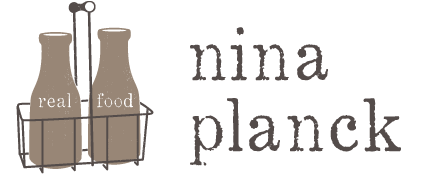The Omnivore's Dilemma
5/12/06
Michael Pollan is a gardener from boyhood, so he comes by his knowledge of flowers, tubers, and fruits from practical experience, topped with what is clearly a formidable reading list and a reporter's eye for detail. I've always thought it wonderful that one obsessed with the sex life of plants should be named after plant sperm.
But Pollan has no practical experience (to my knowledge) with food, farming, or chemistry, which makes his mastery of those topics all the more stunning. In The Omnivore's Dilemma he weaves these complex subjects together elegantly and without breaking a sweat. His narrative on the dominance of corn in the industrial food system is expert, and I enjoyed his take on the Omnivore's Dilemma, a concept identified by psychologist Paul Rozin, who I also discovered while writing Real Food. Pollan's fact-filled, lyrical account of what it means to be an omnivore choosing dinner is a thousand times more compelling than mine.
(Disclosure: Pollan was kind enough to read my manuscript and say nice things. Unfortunately my book was already at the printer by the time I read Pollan's, but I knew it would be indispensable so I put it in my bibliography.)
Pollan's comprehension and analysis of the entire food chain, from farm to factory to fork, is peerless. He is the best in the business.
I would respectfully quibble with a few nutritional points, probably of interest only to geeks like me. They concern fats, meat and B-12, and brain food.
'...polyunsaturated fats are better for us than saturated fats...'
Not quite. All natural fats are good for you and every one plays a vital role in the body. That includes polyunsaturated, monounsaturated, and saturated fats. The effect of saturated fats (falsely maligned for 50 years) is to raise HDL, the so-called 'good' cholesterol. 'High' cholesterol itself is probably a misdiagnosis or non-disease, but that's another column. The only saturated fat that's bad for you is the industrial kind: artificially saturated fats, aka hydrogenated oils.
'...humans no longer need meat in order to survive (now that we can get our  B-12 from fermented foods or supplements)...'
Technically correct, though before B-12 supplements, many humans thrived without meat or poultry, such as the Inuit, who ate mostly fish and blubber. There are many places to get B-12 - except from plants. B-12 is found only in animal foods, and in smaller amounts from the tiny fauna in fermented foods such as real soy sauce. The latter is probably how Asians on inadequate vegetable diets survived severe famines; a little B-12 goes a long way. But there are many other reasons to eat meat. Red meat (and liver) are the top sources of iron and other B vitamins, such as B-6. All humans need complete protein, which can come only from meat, poultry, fish, milk, or eggs. A vegetarian diet including ample milk and eggs (as in all traditional vegetarian cuisines) is adequate, but a vegan diet is not; it lacks protein and B-12.
A vegetarian diet lacking fish is also unwise. The body has an absolute need for omega-3 fats found chiefly in fish. You can find a version of them in a few plants (walnuts, flaxseed) but fish is the indisputable best source. Skipping red meat alone isn't dangerous, but it isn't necessary, either, and there are many reasons to eat animal protein. One other thing: red meat does not cause cancer or heart disease.
Our '...big brain demands a tremendous amount of glucose (the only type of energy the brain can use)...all of which must come from a carbohydrate. Food faddists, take note...'
It's true that the brain only consumes glucose, a simple carbohydrate. But the body can make simple carbs - and does, all day long - from protein and fat, and, of course, from complex carbs. You will never suffer from carb-deficiency syndrome; it doesn't exist. (You could be short of calories, but that's starvation.) What's important about the brain is that it's made of fat. Two thirds of the brain is fat and half of that is fish oil. The brains of schizophrenics, weepy new mothers, and other depressed people either lack adequate fats or have brain-fat metabolism problems. The brain is the house that fat built. The brain is not well-fed on carbs.
Nor is the body. Carbs are useless for building bodies (though I know Pollan was talking brains here). For that you need protein, fat, and minerals. Speaking of fads, 'carb' is not synonymous with 'bread.' There are carbs in most foods, from yogurt to fruit to nuts and yes, even some in steak. Your body will find them; there is no need to get 'energy' from a carb-rich sports drink. If you're too skinny, eat more real food: an egg, or brown rice, or a piece of cheese or dark chocolate.

